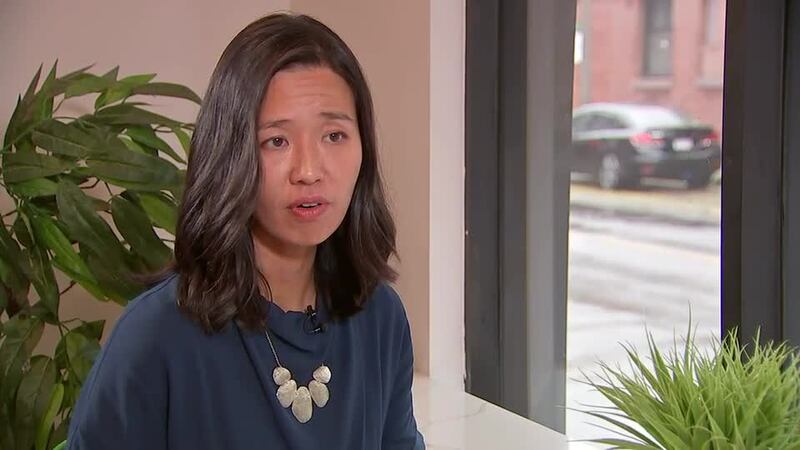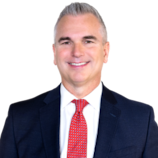BOSTON — Tuesday, November 2, 2021, will mark a historic election in Boston. Residents of the city will elect the first woman and person of color as mayor. Boston 25 News anchor Kerry Kavanaugh has been bringing us in-depth one-on-one interviews with candidates throughout the campaign.
This week she spoke with the last two women standing for one final conversation before election day.
We begin with her conversation with Boston city councilor Michelle Wu.
Kavanaugh: November 16, you would possibly be taking over as mayor of Boston. So, what is your very first order of business?
Wu: We’re building up the team and making sure that we have a core of leaders in there who can connect with every community in our city. The situation at ‘Mass and Cass’ means that every single day that goes by, we’re getting closer to freezing temperatures, we need to take action there. Our school system is still under a lot of stress with the pandemic. And as fall and winter starts, we need to make sure that the classrooms are fitted appropriately for ventilation but also so that our students and teachers can still be comfortable in there. And then we need to continue focusing on the COVID-19 pandemic and our recovery from the situation.
Just like her opponent, fellow city councilor Annissa Essaibi George, Michelle Wu has a long list she’s ready to tackle if elected Boston’s next mayor. And, she will have some $558 million federal pandemic relief aid earmarked for Boston.
Kavanaugh: What are the things that you think desperately need this boost in funding?
Wu: We need to use those funds to address the disparities that were widened even more so during the pandemic. The foundation for our recovery should be housing stability. Everywhere across the city, people are really struggling to stay in their homes and to ensure that they can continue to put a roof over their head, we are going to put $200 million immediately to housing relief.
Part of housing stability for Wu includes rent control, which Essaibi George says will hurt families who own properties.
Kavanaugh: Would your plan to stabilize rents squeeze out those families?
Wu: No, absolutely not. And the goal right now is to use every single tool possible to keep Boston residents in their homes. Two-thirds of our residents rent their homes, and nearly a third of residents are paying more than half their income right now to try to stay in their homes. That is not acceptable. That is not sustainable. But, the models that have worked well in other cities usually involve some form of capping the amounts that rents can go up by annually, as well as having exemptions for small landlords. So, we’re not talking about someone who owns a two-family home or a triple-decker or small buildings. There’s also an allowance if you are a property owner, and you are putting in money into your building to make major renovations, that’s something that is taken into account as well.
Another top concern is the crisis of homelessness and drug addiction at Melnea Cass Boulevard and Massachusetts Avenue. The Suffolk County Sheriff is pushing a plan to open dozens of beds inside an empty building on his jail campus.
Wu: When we have public buildings, when we have resources, we should be leading with a public health lens rather than the law enforcement lens. I’m grateful to Sheriff Tompkins for ensuring that we are moving the conversation forward and taking swift action. We can talk about whether it is this building or a different building. There are resources available, but we all just need to be on the same page and taking action quickly.
Kavanaugh: And so within weeks, do you think you can get people into a space like that if you’re a mayor?
Wu: Yes, one of my first hires is going to be a cabinet-level chief to focus on this very situation. And on these crises of substance abuse, homelessness and mental health, we need full accountability. And so many different community partners have stepped up, we’ve lacked that central coordination.
Kavanaugh: NOAA saying that Boston sea levels are going to rise 16 inches by 2050. That’s within many of our lifetimes. How are you going to keep Boston above water?
Wu: Our plan for the Boston Green New Deal, one of the first city-level climate plans that encompass every action we could take. This is one of the first in the country and it was developed in partnership with residents and with experts. We are ready to go with clear steps. We’ll make sure that every action within city government we can take that we are doing; doubling the number of street trees in Boston to absorb heat and clean the air and absorb stormwater. Changing the way that our stormwater infrastructure functions because in many places across our city, our infrastructure is actually not able to take in that much rain, that much water and then it’s water coming up from the ground. So, we need to make those changes.
Wu’s also eyeing the status of Boston’s schools. She’s called for vastly improving the physical infrastructure, saying many buildings are ‘crumbling.’ Kavanaugh also asked her about the staffing crunch that’s led to a shortage of bus drivers, monitors even teachers.
Wu: All of this starts with getting the operations right, making sure our kids get to school on time, and are in buildings that are safe and healthy, and have the supports they need. Mental health, for example, is going to be continued to be a huge issue in our school system and around the city.
Kavanaugh: I’m curious what you think is the most inaccurate or perhaps unfair thing said about you, and anything you’d want to clarify.
Wu: You know, sometimes when I hear people say things like, our ideas are too bold, or too ‘pie in the sky’ or too ambitious. I take that as a challenge because we know the changes that we need are big, and every single fight that I’ve taken on in my time on the city council, we’ve been told those very same things. Don’t bother trying to make Boston one of the first cities in the country to pass paid parental leave, don’t bother making Boston one of the first cities in the country to rethink how we purchase school lunches for our kids to make them healthier and create more local jobs. But each time we got it done, we have passed more legislation than ever before and done so because we keep bringing people to the table to fight for what we need.
Kavanaugh: Early voting has begun. There’ll be voting until 8 p.m. on Tuesday. What do you want voters to have on their mind about you they cast their ballots?
Wu: What’s on the ballot is the future of Boston, and whether we will continue to just nibble around the edges of the status quo or really take the steps that we need to bring everyone in and make Boston a city for everyone. So as a mom as a daughter of immigrants, I’m excited about the chance to really use every possible step we could take to take down barriers and ensure that we’re planning for the best future for our kids and their kids.
To see a more personal and less policy-driven conversation, check out Kavanaugh’s Coffee With Candidates series with Michelle Wu.
Download the FREE Boston 25 News app for breaking news alerts.
Follow Boston 25 News on Facebook and Twitter. | Watch Boston 25 News NOW
©2021 Cox Media Group









